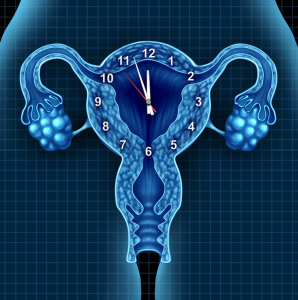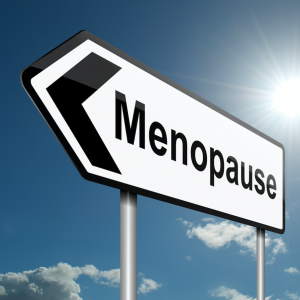01 Feb Perimenopause and Menopause: How they are different
Perimenopause and Menopause – How are they different?
 So here’s the rundown on Perimenopause and Menopause. Menopause is a stage in women’s life that officially marks the end of her reproduction abilities/when a woman stops menstruating. Menopause is a normal part of aging and can occur anytime from the late 40’s to early 50’s. While menopause itself officially occurs when a woman stops having her monthly period, there are several other stages that a woman goes through during this phase. Perimenopause or “menopause transition” is one such phase that happens before a woman actually enters menopause.
So here’s the rundown on Perimenopause and Menopause. Menopause is a stage in women’s life that officially marks the end of her reproduction abilities/when a woman stops menstruating. Menopause is a normal part of aging and can occur anytime from the late 40’s to early 50’s. While menopause itself officially occurs when a woman stops having her monthly period, there are several other stages that a woman goes through during this phase. Perimenopause or “menopause transition” is one such phase that happens before a woman actually enters menopause.
Although both these stages mark the same transition in a woman’s life, they are somewhat different from each other in terms of timelines, symptoms and treatment options. Let’s learn more about perimenopause and understand how it is different from menopause.
Timelines for Perimenopause and Menopause
 Perimenopause: Perimenopause or “menopause transition” is one of the different stages of menopause during which the ovaries begin to produce less estrogen hormones than normal. It can start 8 to 10 years before menopause, usually in a woman’s 40’s. However, in some cases, it can start during the 30’s. The average duration of perimenopause is 4 years, but this stage may continue for 10 years or can even last only a few months for some! This “menopause transition” ends when a woman has not had a period for an entire year. This stage confirms the entry of menopause.
Perimenopause: Perimenopause or “menopause transition” is one of the different stages of menopause during which the ovaries begin to produce less estrogen hormones than normal. It can start 8 to 10 years before menopause, usually in a woman’s 40’s. However, in some cases, it can start during the 30’s. The average duration of perimenopause is 4 years, but this stage may continue for 10 years or can even last only a few months for some! This “menopause transition” ends when a woman has not had a period for an entire year. This stage confirms the entry of menopause.
During the last stages (typically 1-2 years of Perimenopause), the drop in estrogen levels speeds up. Although a woman can experience some menopause symptoms at this stage, she is still having menstrual periods. The possibility of getting pregnant decreases at this point, but a woman can still get pregnant.
Menopause: Menopause is the stage marked by the end of menstrual cycle. At this point, the ovaries produce such a little amount of estrogen that eggs are no longer released. Again, Menopause is established when a woman has not had periods for 12 consecutive months. While menopause normally occurs between the ages of 45 and 55, you may have it earlier if you:
- are a chain smoker
- have a family history of early menopause
- have undergone chemotherapy for cancer treatment causing damage to ovaries
- have had a hysterectomy or oophorectomy with ovaries removed
If a woman enters menopause under the age of 40 it is considered premature menopause.
Symptoms of Perimenopause and Menopause
If you are currently going through the perimenopause phase, you may experience the following symptoms:
- Irregular periods or skipping periods
- Periods that are heavier or lighter than usual
- Worse premenstrual syndrome (PMS)
- Weight gain
- Breast tenderness
- Racing heart
- Hair loss or thinning of hair
- Headaches
- Changes in sex drive
- Difficulty concentrating
- Trouble falling asleep or Insomnia
- Forgetfulness
- Joint and muscle aches
- Urinary tract infections
- Fertility problems
As your estrogen hormone levels drop further, you might start experiencing the following symptoms of menopause.
 Hot flashes
Hot flashes- Night sweats and/or cold flashes
- Depression
- Anxiety or irritability
- Mood swings or mild depression
- Fatigue
- Insomnia
- Frequent urination
- dry skin
- Vaginal Dryness
- Discomfort during sex
- Dry skin
Perimenopause and menopause can also increase a woman’s cholesterol levels. This can put you at an even higher risk for heart disease. It is recommended that you get your cholesterol levels measured at least once a year. Some symptoms such as a racing heart, headaches, urinary changes, and depression can greatly affect a woman during this phase. If you are experiencing abnormal changes in your body, you should see your doctor immediately.
Treatments for Perimenopause and Menopause
In order to ease out the symptoms of perimenopause, your doctor may recommend you undergo Estrogen therapy. Estrogen therapy is available in many forms including creams, gels, pills, and skin patches. These prescription medications normalize the estrogen levels to avoid uncomfortable symptoms caused by sudden hormonal changes.
Your gynecologist or obstetrician may also recommend more targeted menopause medications to relieve the specific symptoms. For example, the prescription vaginal creams can reduce the vaginal dryness and pain during sex. Antidepressants can help reduce anxiety, mood swings, and minor depression symptoms.
If you are experiencing unusual symptoms that are quite discomforting, talk to your doctor. This will help him or her suggest a right treatment option for you.
Controlling Perimenopause Symptoms at Home
There are some ways you can reduce your perimenopause symptoms at home. For example, regular exercise can help you cope with weight gain issues, mood swings, and hot flashes.  If you want to feel better during this phase, or just want to improve your overall well-being, you should include some form of physical activity in your daily regime. If your physique doesn’t allow you to do intense workouts, try going for a brisk walk, a bike ride, or try my award winning beginner workouts that you can even do in a chair! If you are suffering from insomnia, avoid daytime naps and never work out before going to bed, as this can interfere with your ability to sleep at night.
If you want to feel better during this phase, or just want to improve your overall well-being, you should include some form of physical activity in your daily regime. If your physique doesn’t allow you to do intense workouts, try going for a brisk walk, a bike ride, or try my award winning beginner workouts that you can even do in a chair! If you are suffering from insomnia, avoid daytime naps and never work out before going to bed, as this can interfere with your ability to sleep at night.
Here are some other ways by which you can alleviate the symptoms of Perimenopause and Menopause:
- Limit the consumption of alcohol and caffeine
- Quit smoking
- Avoid large and heavy meals
- Stay active
Perimenopause is a natural process and there is nothing to worry about. You may experience certain symptoms as mentioned above, but with so many treatment options available today, doctors try to make the transition as soon as possible. By every means, you should adopt healthy eating habits and lead an active lifestyle to manage your symptoms the natural way. Listen to your body and notice the symptoms that seem unusual. Having a strong understanding of what’s considered normal vs. abnormal will help you avoid any complications.
Be Happy… Be Healthy… Be FIT!
-Natalie Jill
